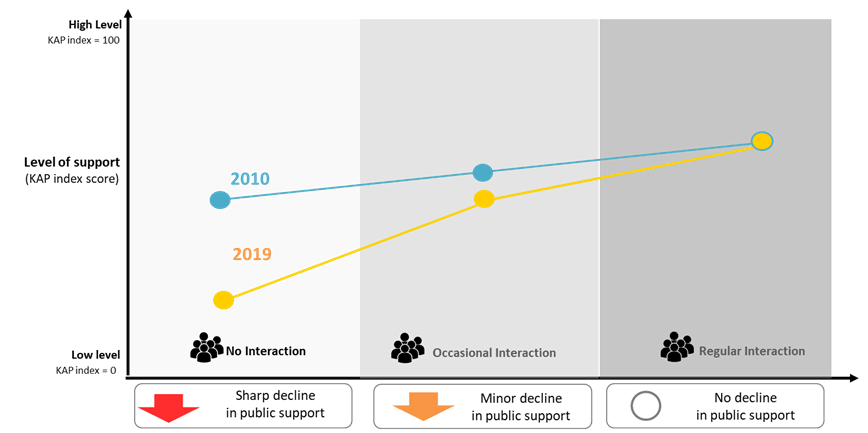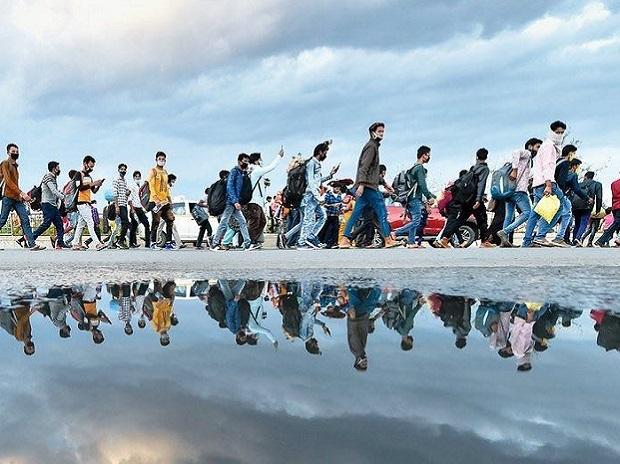Photo credit: PTI, Business Standard
In 2019, Rapid Asia carried out a major survey on attitudes towards migrant workers in four countries (Thailand, Malaysia, Singapore and Japan). The study was jointly funded by TRIANGLE and the Safe and Fair initiatives. The study was conducted to understand better the extent to which people support or don’t support migrant workers, using a proven research model (KAP index Score) that considers peoples’ knowledge, attitude, and behavior towards migrant workers. The 2019 study found that public attitudes and support towards migrant workers in all four countries have worsened compared to nine years earlier in a 2010 baseline study.
Against a backdrop of an increasingly multicultural landscape and growing recognition of the social and economic development of labour migration at the national level. What is affecting public attitudes towards migrant workers for overall support to decline and what can be done to influence this negative trend?
Our analyses have shown that frequency of interaction with migrant workers and type of interaction with migrant workers were the two variables having the strongest influence on support for migrant workers. People who have regular and close contact with migrant workers were found to be significantly more supportive of them. However, over the past nine years polarization in views has increased, and these opposing views have become stronger. People with limited or no interaction with migrant workers are less supportive than before. In our research, this group showed the biggest decline in support towards migrant workers, compared to groups who had occasional or regular interactions – see figure 1 below.

Figure 1: Change in the KAP Index by the level of interaction with migrant workers, 2010-2019
The most robust support was represented by respondents with regular interaction with migrant workers. They included those who had friends or work colleagues who were migrant workers, employed migrant workers, or supervised staff who are migrant workers. People who have regular and close contact with migrant workers were found to be significantly more supportive of them – with the exception of employers of migrant domestic workers. In 2010, a strong positive relationship had been found between employers of migrant domestic workers and their support for migrant workers. In 2019, these results changed dramatically as our findings showed a sharp drop in the KAP index score for employers in Malaysia and Thailand. This shift over the past decade might indicate that domestic migrant workers in these countries, could be at higher risk of discrimination today than was the case in 2010.
The 2019 report concluded with recommendations to give migrants a face and to influence policy towards better integration, to improve public support and attitudes towards migrant workers. Now in 2020, with the current climate impacted by the Covid-19 crisis, public support will be under further pressure. Discrimination and stigma might be exacerbated both in destination and source countries for migrant workers. It is imperative that awareness campaigns focus on debunking generalizations about migrant workers by putting a spotlight on their experiences, fears and hopes in a way to which the general public can relate.
Our research has shown that it is the experience that people have with migrant workers and the quality of that interaction that counts. Covid-19 presents new challenges for policy programming aimed to stimulate better integration. With social distancing measures in place, interaction in communities has changed significantly. Interactions have shifted towards smaller and trusted circles; inevitably, this leads to more segregation between communities. It is important that programming focuses on creating positive exposure for migrant workers, on countering prevailing negative attitudes towards them with visibility of their positive contribution to the economy and ‘fabric of society’. This exposure is critical to mitigating the impact of a decline in meaningful encounters on public support for migrant workers and the polarization of attitudes.
If you found this article useful, please remember to ‘Like’ and share on social media, and hit the ‘Follow’ button never to miss an article. You may also want to read this article: Impact of COVID-19 on Domestic Migrants
About the authors: Daniel Lindgren is the Founder of Rapid Asia Co., Ltd., a management consultancy firm based in Bangkok that specializes in evaluations for programs, projects, social marketing campaigns and other social development initiatives. Nadine Spalburg is an independent consultant working with Rapid Asia as a member of their expert panel of consultants.

